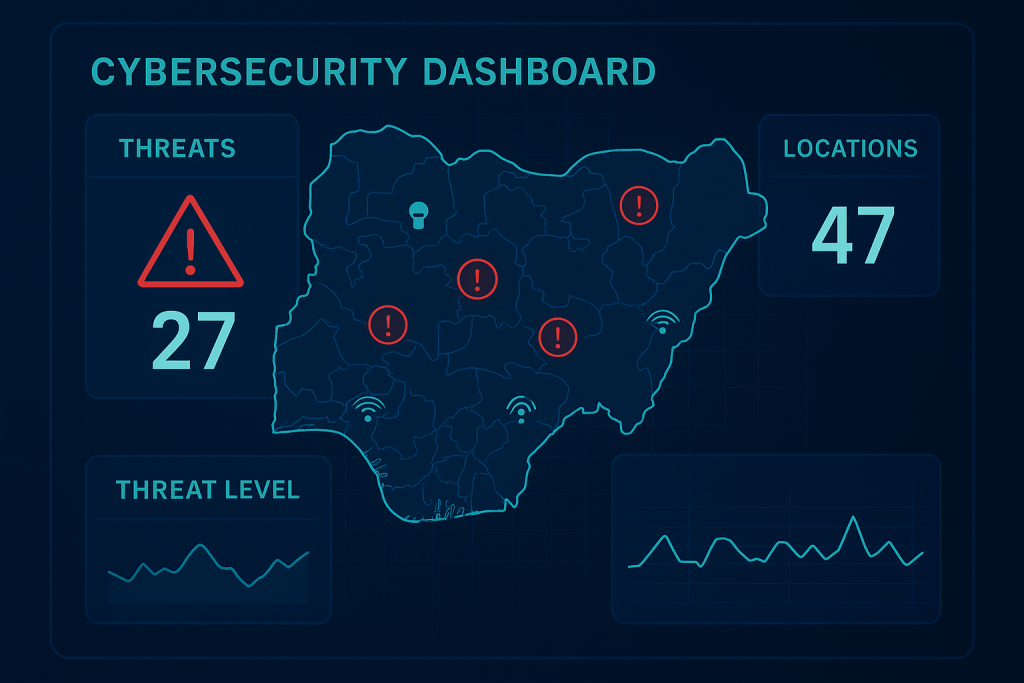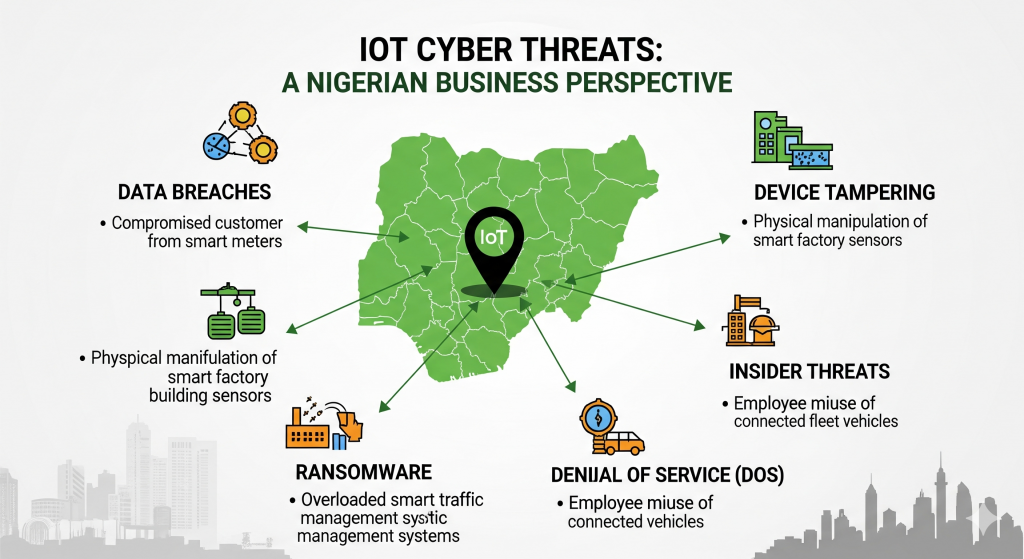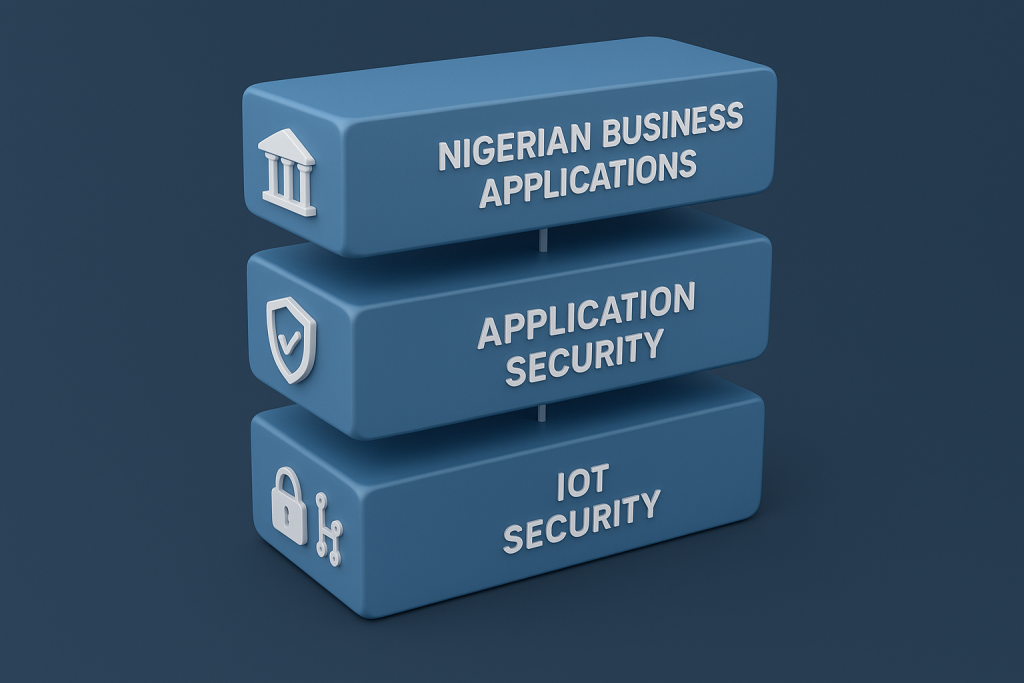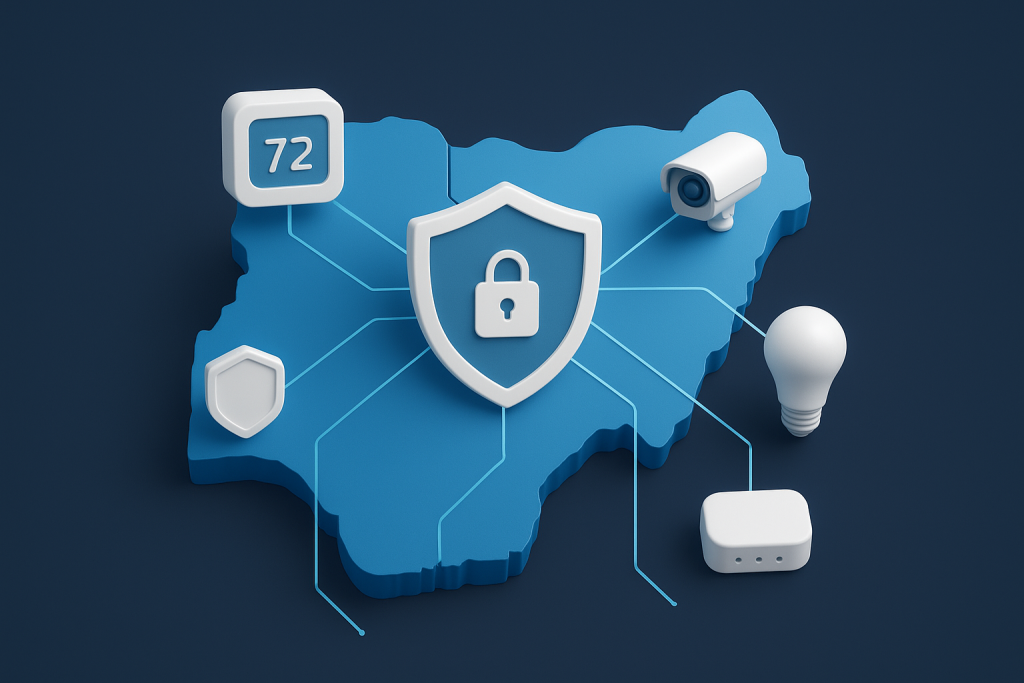The Hidden Security Crisis Threatening Nigerian Businesses
Nigerian businesses are embracing IoT connectivity at unprecedented rates, with Lagos alone seeing 340% growth in IoT device deployments over the past 24 months. However, this rapid expansion comes with a dangerous blind spot: 89% of Nigerian companies using IoT devices have experienced security breaches in 2025, according to the Nigerian Communications Commission (NCC).
While businesses focus on operational benefits like cost reduction and efficiency gains, cybercriminals are exploiting vulnerabilities in everything from smart payment systems in Lagos markets to remote monitoring devices in agricultural operations across Kaduna and Kano states. The financial impact is staggering – Nigerian businesses lost an estimated ₦156 billion to IoT-related cyberattacks in 2024 alone.
The challenge is particularly acute for companies using roaming SIMs and multinetwork connectivity solutions. These devices often operate across multiple cellular networks including MTN, Airtel, Glo, and 9mobile, creating complex security landscapes that traditional protection methods cannot adequately address.

1. The Evolving Threat Landscape in African IoT Networks
Rising Cyber Threats Across Nigeria
The security threat landscape for Nigerian IoT deployments has fundamentally shifted in 2025. Where businesses once worried primarily about device theft and physical tampering, today’s threats are sophisticated, remote, and often invisible until significant damage occurs.
M2M connectivity Africa networks face unique vulnerabilities due to their distributed nature and often minimal security oversight. Attackers exploit weak authentication protocols, unencrypted data transmission, and poor device management practices to gain unauthorized access to business-critical systems.
Common Attack Vectors in Nigerian IoT Deployments
Device hijacking represents the most common threat, with criminals taking control of IoT devices to steal data, disrupt operations, or use devices as entry points into broader corporate networks. Nigerian banking partners like FCMB and Wema Bank have reported increased attempts to compromise IoT-enabled ATM networks and point-of-sale systems.
Data interception attacks target information transmitted between IoT devices and management platforms. Without proper encryption, sensitive business data traveling across cellular IoT Nigeria networks becomes vulnerable to theft and manipulation.
Industry-Specific Vulnerabilities
Different industries face distinct threat profiles. Logistics companies using GPS tracking devices experience attempts to manipulate location data and steal cargo information. Agricultural operations deploying remote monitoring solutions see attacks aimed at disrupting irrigation systems and stealing crop data.
Manufacturing facilities using IoT for equipment monitoring face threats designed to cause production delays and steal proprietary operational information. Each sector requires tailored security approaches that address specific vulnerabilities while maintaining operational efficiency.

2. Universal SIM Security: Protecting Multi-Network Connectivity
The Multi-Network Security Challenge
Universal SIM technology offers exceptional connectivity benefits for Nigerian businesses, automatically switching between network operators to maintain continuous service. However, this multi-carrier connectivity creates complex security considerations that many businesses overlook during deployment.
Each network transition potentially exposes devices to different security protocols and vulnerability profiles. A device might connect to MTN’s network with one security configuration, then switch to Airtel’s network with different encryption standards and authentication requirements.
Advanced Security Features in Modern Universal SIMs
Leading universal SIM providers implement sophisticated security measures specifically designed for African telecommunications environments. These include end-to-end encryption that remains constant regardless of which network operator handles data transmission.
Certificate-based authentication ensures only authorized devices can access network resources, while advanced SIM management platforms provide real-time monitoring of device behavior and network connections. These platforms can detect unusual activity patterns that might indicate security breaches.
Network-Agnostic Security Protocols
The most effective security implementations operate independently of underlying network infrastructure. This means security measures function consistently whether devices connect through MTN, Airtel, Glo, or 9mobile networks, eliminating gaps that attackers might exploit during network transitions.
Encrypted data transmission protocols ensure information remains protected throughout the entire communication pathway, from device sensor to business management platform. This comprehensive protection proves essential for Nigerian businesses operating across diverse network coverage areas.
3. Implementing Comprehensive IoT Security Frameworks
Multi-Layered Security Architecture
Effective IoT security requires multiple defense layers working together to create comprehensive protection. Device-level security includes hardware encryption, secure boot processes, and tamper detection systems that alert administrators to physical interference attempts.
Network-level protection encompasses secure communication protocols, encrypted data transmission, and network access controls that prevent unauthorized devices from connecting to business systems. Application-level security includes user authentication, data encryption, and access controls that limit who can view and modify IoT data.
SIM Management Platform Security
Advanced SIM management platforms provide centralized security oversight for all connected devices. These platforms monitor device behavior patterns, detect anomalous activity, and automatically implement protective measures when threats are identified.
Real-time threat detection capabilities analyze network traffic patterns, device communication behaviors, and data transmission anomalies to identify potential security breaches before they cause significant damage. Automated response systems can isolate compromised devices and alert security teams immediately.
Regular Security Updates and Monitoring
IoT security requires ongoing attention and regular updates to address emerging threats. Device firmware must be updated regularly to patch vulnerabilities and implement enhanced security features. Network security protocols require periodic review and updates to maintain effectiveness against evolving attack methods.
Continuous monitoring systems track device performance, network connections, and data transmission patterns to identify potential security issues. These systems provide early warning of problems and enable proactive response before attacks succeed.

4. Business Impact and Cost Considerations
Financial Impact of IoT Security Breaches
Nigerian businesses experiencing IoT security breaches report average costs of ₦23.7 million per incident, including direct financial losses, operational disruption, and recovery expenses. Manufacturing companies face additional costs from production delays and equipment damage.
Regulatory compliance issues add another layer of financial risk. The Nigerian Communications Commission has increased penalties for businesses that fail to implement adequate IoT security measures, with fines reaching ₦50 million for serious breaches affecting customer data.
ROI of Comprehensive Security Implementation
Despite initial investment requirements, comprehensive IoT security delivers strong return on investment through reduced breach costs, improved operational efficiency, and enhanced customer trust. Nigerian businesses implementing advanced security measures report 78% reduction in security incidents and 45% improvement in overall system reliability.
Security investments also enable businesses to pursue more ambitious IoT projects with confidence. Companies with robust security frameworks deploy IoT solutions 65% faster and achieve better operational results compared to those with minimal protection.
Cost-Effective Security Strategies
Effective IoT security doesn’t require massive investments. Prioritizing high-impact security measures like encrypted communications, device authentication, and network monitoring provides substantial protection at reasonable cost.
Partnering with experienced IoT connectivity providers offers access to enterprise-grade security features without requiring internal security expertise. This approach proves particularly valuable for small and medium Nigerian businesses that lack dedicated IT security teams.
5. Industry Success Stories and Implementation Examples
Lagos Banking Sector Implementation
A major Nigerian bank partnered with GenYZ Solutions to secure their IoT-enabled branch operations across Lagos and Abuja. The implementation included encrypted roaming SIMs for ATM connectivity, secure device management platforms, and real-time threat monitoring systems.
Results exceeded expectations: security incidents dropped by 82%, network uptime improved to 99.7%, and operational costs decreased by 28% through improved efficiency and reduced security management overhead. The success led to expansion across all Nigerian branches.
Agricultural IoT Security Success
A large agricultural operation in Kaduna state implemented comprehensive IoT security for their remote monitoring systems. The solution included tamper-resistant sensors, encrypted data transmission, and secure universal SIM connectivity across rural areas with varying network coverage.
The security implementation protected valuable crop data while enabling real-time monitoring of irrigation systems, weather conditions, and equipment status. Productivity increased 34% while security incidents eliminated completely after implementation.
Manufacturing Sector Transformation
A Lagos-based manufacturing company deployed IoT security solutions for their equipment monitoring and predictive maintenance systems. The implementation included device-level encryption, network security protocols, and advanced threat detection capabilities.
Security benefits extended beyond protection to enable new operational capabilities. Real-time equipment monitoring improved efficiency by 41%, while predictive maintenance reduced unplanned downtime by 67%. The security framework enabled expansion to additional facilities with confidence.
6. Selecting the Right IoT Security Partner
Evaluation Criteria for Security Providers
Choosing the right IoT security partner requires careful evaluation of technical capabilities, local market experience, and ongoing support quality. Providers must demonstrate expertise with African telecommunications challenges and regulatory requirements.
Technical evaluation should include security architecture assessment, encryption capabilities, threat detection systems, and incident response procedures. Providers must offer comprehensive protection that functions effectively across Nigeria’s diverse network environment.
Local Support and Expertise Requirements
Nigerian IoT deployments require partners with local presence and understanding of regional challenges. Security threats and network conditions vary significantly across different Nigerian regions, requiring localized expertise and rapid response capabilities.
Support quality becomes critical during security incidents when immediate response can prevent significant damage. Partners must offer 24/7 monitoring and rapid incident response with local technical teams capable of on-site support when required.
Integration and Scalability Considerations
Security solutions must integrate seamlessly with existing business systems while supporting future growth and expansion. Scalable architectures enable businesses to add devices and expand coverage without compromising security or requiring complete system replacement.
API integration capabilities ensure security systems work effectively with business management platforms, providing comprehensive visibility and control across all IoT deployments. This integration proves essential for maintaining security as deployments grow in size and complexity.
Future-Proofing Your IoT Security Strategy
Emerging Security Technologies
The IoT security landscape continues evolving with new technologies and threat protection methods. Artificial intelligence and machine learning enhance threat detection capabilities, enabling systems to identify and respond to previously unknown attack patterns.
Edge computing security reduces dependence on network connectivity for security functions while improving response times to local threats. These technologies prove particularly valuable for Nigerian businesses operating in areas with variable network quality.
Regulatory Compliance Evolution
Nigerian regulatory requirements for IoT security continue developing as the technology becomes more widespread. The Nigerian Communications Commission regularly updates security standards and compliance requirements for businesses deploying IoT solutions.
Staying ahead of regulatory changes requires partnerships with providers who monitor regulatory developments and ensure compliance with evolving requirements. This proactive approach prevents compliance issues and associated penalties.
Long-Term Security Planning
Effective IoT security requires long-term planning that accounts for technology evolution, changing threat landscapes, and business growth. Security architectures must adapt to new technologies while maintaining protection effectiveness.
Investment in flexible, upgradeable security solutions ensures long-term value and protection as threats and technologies continue evolving. This approach proves more cost-effective than reactive security implementations that require frequent replacement.
Conclusion: Building Secure IoT Infrastructure for Nigerian Business Success
The rapid growth of IoT connectivity across Nigerian businesses creates unprecedented opportunities for operational improvement and competitive advantage. However, these benefits can only be realized with comprehensive security measures that protect against evolving cyber threats.
Nigerian businesses can no longer treat IoT security as an afterthought. With 89% of companies experiencing security breaches and average costs exceeding ₦23 million per incident, comprehensive protection has become essential for sustainable business operations.
Success requires partnering with experienced providers who understand both the opportunities and challenges of African IoT deployments. The right security framework enables businesses to pursue ambitious IoT projects with confidence while protecting valuable assets and data.
Ready to Secure Your IoT Infrastructure?
Contact Genyz Solutions today for a comprehensive IoT security consultation tailored to Nigerian business requirements.

